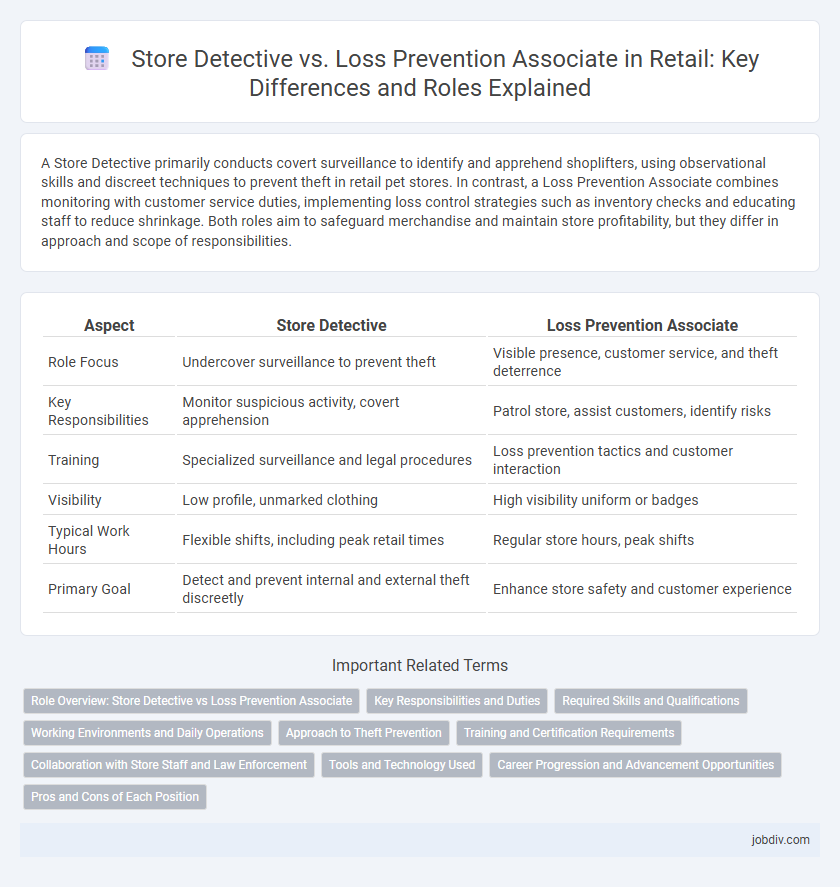A Store Detective primarily conducts covert surveillance to identify and apprehend shoplifters, using observational skills and discreet techniques to prevent theft in retail pet stores. In contrast, a Loss Prevention Associate combines monitoring with customer service duties, implementing loss control strategies such as inventory checks and educating staff to reduce shrinkage. Both roles aim to safeguard merchandise and maintain store profitability, but they differ in approach and scope of responsibilities.
Table of Comparison
| Aspect | Store Detective | Loss Prevention Associate |
|---|---|---|
| Role Focus | Undercover surveillance to prevent theft | Visible presence, customer service, and theft deterrence |
| Key Responsibilities | Monitor suspicious activity, covert apprehension | Patrol store, assist customers, identify risks |
| Training | Specialized surveillance and legal procedures | Loss prevention tactics and customer interaction |
| Visibility | Low profile, unmarked clothing | High visibility uniform or badges |
| Typical Work Hours | Flexible shifts, including peak retail times | Regular store hours, peak shifts |
| Primary Goal | Detect and prevent internal and external theft discreetly | Enhance store safety and customer experience |
Role Overview: Store Detective vs Loss Prevention Associate
A Store Detective specializes in covert surveillance and apprehension of shoplifters, implementing targeted strategies to reduce theft and inventory shrinkage. A Loss Prevention Associate combines visible store presence with customer service to deter theft, conduct audits, and manage safety protocols. Both roles aim to protect retail assets but differ in tactical approach and interaction with customers.
Key Responsibilities and Duties
A Store Detective primarily focuses on undercover surveillance, identifying shoplifters, and gathering evidence to prevent theft, often working discreetly within the retail environment. Loss Prevention Associates generally perform a broader range of duties, including monitoring security systems, conducting safety inspections, training staff on loss prevention protocols, and managing inventory control to reduce shrinkage. Both roles aim to protect retail assets, but Store Detectives concentrate on detection and apprehension, while Loss Prevention Associates emphasize prevention and operational support.
Required Skills and Qualifications
Store Detectives require strong observational skills, attention to detail, and the ability to blend seamlessly into the retail environment to identify and prevent theft. Loss Prevention Associates need excellent communication skills, knowledge of retail security systems, and the capability to handle conflict and perform investigations. Both roles demand physical fitness, integrity, and experience in surveillance techniques alongside a thorough understanding of retail policies.
Working Environments and Daily Operations
Store Detectives operate primarily on the retail floor, blending in with customers to discreetly monitor for theft and suspicious behaviors, often working irregular hours to meet the store's security needs. Loss Prevention Associates typically perform a broader range of duties, including surveillance, inventory checks, and coordinating with management, within both the store environment and corporate offices. Daily operations for Store Detectives emphasize covert observation and immediate response, while Loss Prevention Associates focus on preventive strategies and collaboration with store personnel.
Approach to Theft Prevention
Store Detectives utilize covert surveillance techniques and behavior analysis to identify suspicious activities, enabling discreet intervention before theft occurs. Loss Prevention Associates employ a more visible presence, combining customer service with monitoring to deter potential shoplifters through active engagement and routine patrols. Both roles integrate technology such as CCTV and electronic article surveillance (EAS) systems to enhance theft detection and response effectiveness.
Training and Certification Requirements
Store Detectives require specialized training in covert surveillance techniques, theft detection, and legal compliance, often backed by certification programs like the National Association of Security Professionals (NASP). Loss Prevention Associates typically undergo broader training covering inventory control, customer service, and emergency response, with certifications such as Certified Loss Prevention Professional (CLPP) enhancing their qualifications. Both roles benefit from ongoing training in retail security technology and legal updates to maintain effectiveness in reducing shrinkage.
Collaboration with Store Staff and Law Enforcement
Store Detectives collaborate closely with store staff to identify suspicious behavior and gather evidence discreetly, enhancing in-store security measures. Loss Prevention Associates work alongside both store employees and local law enforcement to implement theft prevention strategies and respond to incidents effectively. Their combined efforts ensure a proactive approach in minimizing shrinkage and maintaining a safe shopping environment.
Tools and Technology Used
Store Detectives primarily use covert surveillance equipment, RFID tagging systems, and loss prevention software to identify and prevent theft discreetly. Loss Prevention Associates rely on electronic article surveillance (EAS) alarms, CCTV monitoring, and point-of-sale analytics to deter shoplifting and internal fraud. Both roles utilize mobile communication devices and data analytics platforms to enhance real-time response and security measures within retail environments.
Career Progression and Advancement Opportunities
Store Detectives often focus on direct surveillance and theft prevention, providing a strong foundation in security protocols and incident management. Loss Prevention Associates typically engage in broader loss control strategies, including data analysis and compliance, offering more diverse skill development conducive to managerial roles. Career progression for Loss Prevention Associates generally leads to supervisory or regional management positions, while Store Detectives may advance toward specialized investigative or security consultant roles within retail.
Pros and Cons of Each Position
Store Detectives offer specialized skills in covert surveillance and identifying shoplifters, enhancing theft deterrence and real-time incident response, but their role often requires high alertness and can involve stressful confrontations. Loss Prevention Associates provide broader responsibilities including inventory control, safety compliance, and customer service, which contribute to overall store security but may lack the covert investigative focus of Store Detectives. While Store Detectives excel in targeted loss prevention tactics, Loss Prevention Associates support comprehensive risk management efforts, making each role suited to different retail security strategies.
Store Detective vs Loss Prevention Associate Infographic

 jobdiv.com
jobdiv.com